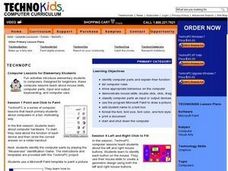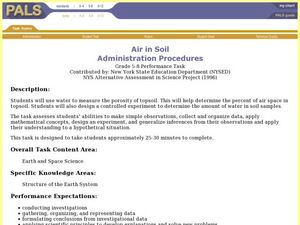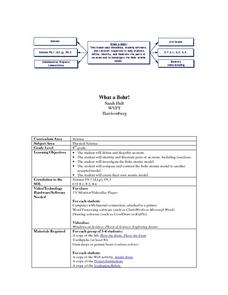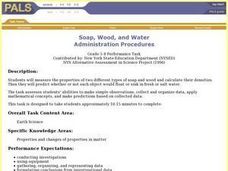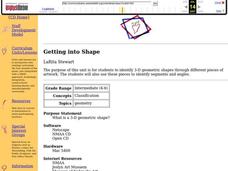Curated OER
What's Inside My Computer?
Pupils draw a picture of what they think a computer looks like inside. They learn the function of each part of a computer, the definitions of unfamiliar computer terms, and complete a worksheet of definitions of computer parts.
TryEngineering
Arduino Blink Challenge
Who knew turning a light on and off could be so complicated? In the lesson, pupils use Arduino boards to learn about computer codes and programs. They program an Arduino to make a light turn on and off at certain time intervals.
Curated OER
Human Computer Game
Students view the "Parts of a Computer" Power Point presentation then they view the inside of a computer and break down each operating system and its job. They compare and contrast the difference between human and computer parts that...
Curated OER
Parts of a Computer
Students, after identifying the parts of a computer, and categorizing the parts by functions (input, output, process, and storage), explore how all the parts of a computer work together. They compare/contrast the differences between...
Curated OER
Computer Skills for the Classroom and Beyond
Students discover the concept of telecomputing. They identify the ways it promotes a global community. They exchange e-mails with students in other countries. They also examine the difference between public and private information.
Curated OER
Techno PC: Computer Lessons for Elementary Students
Students explore computer science by participating in mini activities. In this graphic design lesson, identify the different components on a personal computer and define their purpose. Students utilize Microsoft Paint to create a digital...
Curated OER
Growth and Changes in Plants
Students investigate the growth and changes in plants. They view a video and discuss the changes in plants. They work in small groups to demonstrate vocabulary words to the class. They visit a green house and take pictures of plants to...
Curated OER
Patterns: A Stitch in Time
Students recognize shapes, designs and numbers that form patterns. Using their surroundings, they identify common patterns. They create their own patterns in various software programs and share them with the class.
Curated OER
Air in Soil Administration Procedures
Young scholars study soil and its composition. In this soil composition lesson, students study examples of soil during several days of aeration. Young scholars summarize their data, organize it, and must be able to explain their findings.
Curated OER
What is a Seed?
First graders identify the parts of a seed. In this plant biology lesson, 1st graders are given a seed and identify each part of the seed by using a hand lens. Students plant a seed and graph the growth.
Curated OER
Starch and Sugar Testing 1
Eighth graders determine the presence of starch and sugar in unknown solutions. This task assesses students' abilities to observe, record and interpret data, classify, generalize/infer, construct data tables, and identify sugar and...
Curated OER
Mapping the Blue Part
Eighth graders determine the location of specific features of the stimulated ocean floor. The features include the continental shelf, continental slope, an ocean trench, and a mid-oceaniz ridge.
Curated OER
What a Bohr!
Students define, identify and illustrate the parts of an atom, and investigate the Bohr atomic model. Students watch a multimedia presentation to understand an atom's parts and their functions. In groups, they create a model of an atom...
Curated OER
Function Junction
Students identify the internal and external components of computers, robots and fan. In this physics lesson, students draw a circuit diagram of their electronic components. They create a battery tester in the lab.
Curated OER
Rolling Down Hill
Students perform an experiment, collect, and analyze data of a rolling marble down a ramp. They report results after they complete their experiment. Students are assessed in science and writing.
Curated OER
Soap, Wood, and Water
Learners measure the properties of two different types of soap and wood and calculate their densities. Then they predict whether or not whether or not each object would float or sink in fresh or salt water.
Curated OER
Input Devices
Eleventh graders recall and identify what terms mean. They give an example of one of the term's hardware components. Students are taught how Input and Output devices work. They recognize acutual component in the computer as they are...
Curated OER
To Drink or not to Drink
Seventh graders discuss water quality, water availability and water resources and how water is used in the world around them. They view a video on water quality then test for pH, temperature and dissolved oxygen to indicate water quality.
Curated OER
Uniform Motion
Students identify when uniform motion occurs. They watch a teacher made PowerPoint explaining the concept of uniform motion and carry out an experiment to understand the concept.
Curated OER
Getting into Shape
Students identify 3-D geometric shapes through different pieces of artwork. They examine and identify segments and angles. Students act out shapes and create a piece of artwork. Additional cross curriculum activities are listed.
Discovery Education
The Everyday Science of Sports
Physical science juniors will enjoy this sensational enrichment on aerodynamics, especially if they are also sports fans! With a focus on physical features and behaviors, collaborative groups make observations on five different golf...
National Nanotechnology Infrastructure Network
Lines on Paper - Laser Box
See what you cannot see by getting a little creative. An intriguing lesson has learners use lasers to explore X-ray diffraction. Given a box with unknown structures, they shine a laser through the box and interpret the results....
Curated OER
Estimation Task
Upper graders practice their estimation skills by observing different objects then making their best guess without using measuring instruments. Students are asked to estimate mass, length, volume, and area.
Curated OER
Smart Move!
Students visualize a communication system. They encode, decode, transmit, receive and store messages. Students use a code sheet and flashlight for this process. They will also maintain a storage sheet from which they can retrieve...





